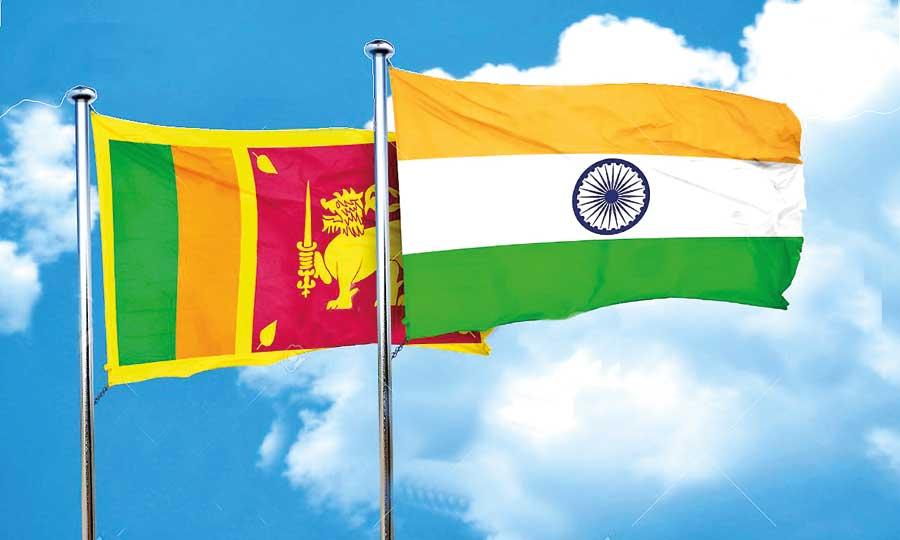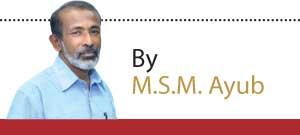23 Apr 2021 - {{hitsCtrl.values.hits}}

- It is vivid that India has been using the Sri Lankan Tamil issue to advance its own interests
- At a time when Sri Lanka was desperately longing for India’s support last month as well, the latter used the devolution issue as a precondition
- Sri Lanka is in a catch 22 situation in respect of conducting of provincial council elections due to a legal hiccup that has been created by an amendment to the Provincial Councils Election Act brought in by the last Yahapalana government
The impression the government had instilled in the minds of the people soon after the Sri Lanka Podujana Peramuna (SLPP) captured power that the provincial council system would be scrapped has by now vanished into thin air.
system would be scrapped has by now vanished into thin air.
Barely a fortnight after assuming office as the President, Gotabaya Rajapaksa stated in India that it was through development and not through devolution that the problems faced by the Tamil people could be resolved. And he had assigned the subject of Provincial Councils to Rear Admiral Sarath Weerasekara who is dead set against the concept of devolution of power and provincial councils. And Weerasekara in turn had been expressing his antipathy towards the provincial council system.
However, now the government and the ruling SLPP is said to be discussing about holding of provincial council election which has delayed for over two years. The backpedalling is obviously due to the pressure exerted by India and the United Nations Human Rights Council (UNHRC). Indian leaders, though not interested in the merger of Northern and Eastern Provinces now, have been insisting on conferring more powers to the provincial councils.
It must be recalled that Indian External Affairs Minister Dr. S. Jaishanker arrived in Sri Lanka within 24 hours after Gotabaya Rajapaksa taking oaths as the President on November 18 with a personal message from Indian Prime Minister Narendra Modi and held talks with the new Sri Lankan President. Dr. Jaishankar had conveyed to President Rajapaksa “India’s expectation that the Sri Lankan government take forward the process of national reconciliation to arrive at a solution that meets the aspirations of the Tamil community for equality, justice, peace and dignity.”
On November 29, 2019, eleven days after assuming office, President Rajapaksa visited New Delhi. During the joint Press briefing with the new Sri Lankan leader, Modi also echoed the same sentiments with the same sentence. However, as if he wanted to allay doubts and stress what he specifically meant, he added that “it also includes the implementation of the 13th Amendment.”
On February 2, two days after the Cabinet decided to pull out from the Memorandum of Cooperation (MOC) signed in May 2019 with the Governments of India and Japan for the development of the Eastern Terminal of the Colombo Harbour, the Indian Deputy High Commissioner, Vinod. K. Jacob met two Tamil leaders from the Eastern Province, former Chief Minister and current MP, Sivanesathurai Chandrakanthan alias Pillayan, and former Deputy Minister Vinayagamurthi Muralitharan, alias Karuna Amman, and discussed the 13A. He had reiterated that meaningful devolution is the way forward for achieving the aspirations of the Tamil people and stressed full implementation of the 13th amendment.
At a time when Sri Lanka was desperately longing for India’s support last month as well, the latter used the devolution issue as a precondition. When Sri Lanka was facing a harsh resolution at the recent UNHRC session, India’s Permanent Representative to the UN Indra Mani Pande, while addressing the council on last February 25, insisted that aspirations of the Sri Lankan Tamils must be addressed “through the process of reconciliation and full implementation of the 13th Amendment to the Constitution of Sri Lanka.”
It is vivid that India has been using the Sri Lankan Tamil issue to advance its own interests. The issue is a lever for India to tame its southern neighbour when needed. Yet, these facts point that Sri Lanka would have to pay a heavy price if it resorted to abrogate the provincial council system arbitrarily, especially ignoring India.
Against this backdrop, India now wants provincial council elections held soon. India’s position in this regard had been asserted in a letter to AIADMK Rajaya Sabha member M.Thambi Durai recently by Dr. Jaishankar. The Indian External Affairs Minister in his letter had linked India’s stand in this regard to his country’s abstention from voting for the last month’s UNHRC resolution on Sri Lanka.
However, Sri Lanka is in a catch 22 situation in respect of conducting of provincial council elections due to a legal hiccup that has been created by an amendment to the Provincial Councils Election Act brought in by the last Yahapalana government. The Amendment introduced in September 2017 provides for conducting of elections for the provincial councils under the mixed electoral system of first-past-the-post system and the Proportional Representation (PR) system.
Yet, the mixed electoral system has run into controversy after it was experimented at the local government elections held on February 10, 2018, as many flaws in the new system were identified. In the wake of the LG elections even former President Mahinda Rajapaksa under whose leadership the SLPP swept the electorate had stated that the new system had to be changed again, as it had created a mess in many LG bodies.
There are strong grounds not only for the politicians but also for the people to reject the mixed electoral system in its present form, despite it having been experimented only at the last LG polls. It doubles the number of council members (from around 4,000 to 8,000 LG members) and it is the public coffers that have to maintain and facilitate them. Without a cut-off point for political parties to be eligible to represent the councils, many small parties won seats, creating an Opposition larger than the ruling party in many councils.
This muddled situation was further aggravated by the ridding of the bonus seat system that had earlier strengthened the winning parties to be above the collective strength of the Opposition parties. The mess resulted in unethical deals among political parties, although those settlements helped later for the smooth functioning of the councils. Besides, wards have to be demarcated within each provincial council area under the new system. Political parties are now divided over the system with one group preferring to revert to the old PR system and others wanting to stick to the new system, but with changes.
The second group is also in turn divided. During a recent discussion among the constituent parties of the ruling coalition, one group had proposed to field three candidates from each party for each ward which had been opposed by a section of the SLPP and smaller parties in the coalition. The proposal would definitely reintroduce the preferential voting system which would again lead to intra-party conflicts. There is no sign of any settlement to these controversies either.
Interestingly, no complaints were heard about the absence of elected provincial councils for the past three years even from the politicians representing the Northern and Eastern Provinces for which the devolution of power was originally meant. Nevertheless, the country has to maintain the system for two reasons – external pressure and Tamils would feel alienated if the system is done away with.
29 Nov 2024 50 minute ago
29 Nov 2024 2 hours ago
29 Nov 2024 2 hours ago
29 Nov 2024 3 hours ago
29 Nov 2024 4 hours ago